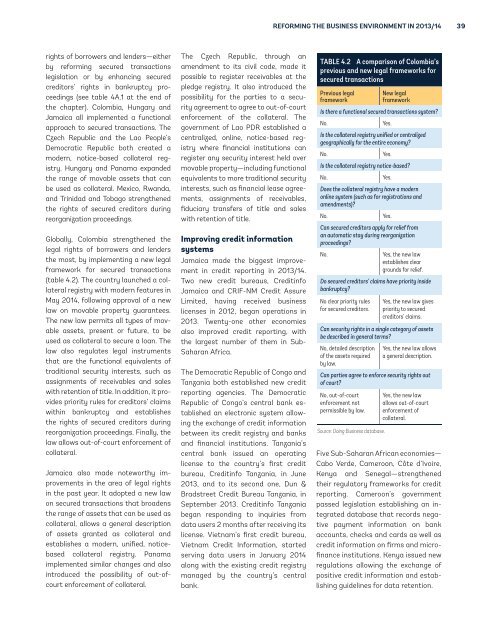bc8G2-7
bc8G2-7
bc8G2-7
Create successful ePaper yourself
Turn your PDF publications into a flip-book with our unique Google optimized e-Paper software.
REFORMING THE BUSINESS ENVIRONMENT IN 2013/14<br />
39<br />
rights of borrowers and lenders—either<br />
by reforming secured transactions<br />
legislation or by enhancing secured<br />
creditors’ rights in bankruptcy proceedings<br />
(see table 4A.1 at the end of<br />
the chapter). Colombia, Hungary and<br />
Jamaica all implemented a functional<br />
approach to secured transactions. The<br />
Czech Republic and the Lao People’s<br />
Democratic Republic both created a<br />
modern, notice-based collateral registry.<br />
Hungary and Panama expanded<br />
the range of movable assets that can<br />
be used as collateral. Mexico, Rwanda,<br />
and Trinidad and Tobago strengthened<br />
the rights of secured creditors during<br />
reorganization proceedings.<br />
Globally, Colombia strengthened the<br />
legal rights of borrowers and lenders<br />
the most, by implementing a new legal<br />
framework for secured transactions<br />
(table 4.2). The country launched a collateral<br />
registry with modern features in<br />
May 2014, following approval of a new<br />
law on movable property guarantees.<br />
The new law permits all types of movable<br />
assets, present or future, to be<br />
used as collateral to secure a loan. The<br />
law also regulates legal instruments<br />
that are the functional equivalents of<br />
traditional security interests, such as<br />
assignments of receivables and sales<br />
with retention of title. In addition, it provides<br />
priority rules for creditors’ claims<br />
within bankruptcy and establishes<br />
the rights of secured creditors during<br />
reorganization proceedings. Finally, the<br />
law allows out-of-court enforcement of<br />
collateral.<br />
Jamaica also made noteworthy improvements<br />
in the area of legal rights<br />
in the past year. It adopted a new law<br />
on secured transactions that broadens<br />
the range of assets that can be used as<br />
collateral, allows a general description<br />
of assets granted as collateral and<br />
establishes a modern, unified, noticebased<br />
collateral registry. Panama<br />
implemented similar changes and also<br />
introduced the possibility of out-ofcourt<br />
enforcement of collateral.<br />
The Czech Republic, through an<br />
amendment to its civil code, made it<br />
possible to register receivables at the<br />
pledge registry. It also introduced the<br />
possibility for the parties to a security<br />
agreement to agree to out-of-court<br />
enforcement of the collateral. The<br />
government of Lao PDR established a<br />
centralized, online, notice-based registry<br />
where financial institutions can<br />
register any security interest held over<br />
movable property—including functional<br />
equivalents to more traditional security<br />
interests, such as financial lease agreements,<br />
assignments of receivables,<br />
fiduciary transfers of title and sales<br />
with retention of title.<br />
Improving credit information<br />
systems<br />
Jamaica made the biggest improvement<br />
in credit reporting in 2013/14.<br />
Two new credit bureaus, Creditinfo<br />
Jamaica and CRIF-NM Credit Assure<br />
Limited, having received business<br />
licenses in 2012, began operations in<br />
2013. Twenty-one other economies<br />
also improved credit reporting, with<br />
the largest number of them in Sub-<br />
Saharan Africa.<br />
The Democratic Republic of Congo and<br />
Tanzania both established new credit<br />
reporting agencies. The Democratic<br />
Republic of Congo’s central bank established<br />
an electronic system allowing<br />
the exchange of credit information<br />
between its credit registry and banks<br />
and financial institutions. Tanzania’s<br />
central bank issued an operating<br />
license to the country’s first credit<br />
bureau, Creditinfo Tanzania, in June<br />
2013, and to its second one, Dun &<br />
Bradstreet Credit Bureau Tanzania, in<br />
September 2013. Creditinfo Tanzania<br />
began responding to inquiries from<br />
data users 2 months after receiving its<br />
license. Vietnam’s first credit bureau,<br />
Vietnam Credit Information, started<br />
serving data users in January 2014<br />
along with the existing credit registry<br />
managed by the country’s central<br />
bank.<br />
TABLE 4.2 A comparison of Colombia’s<br />
previous and new legal frameworks for<br />
secured transactions<br />
Previous legal<br />
framework<br />
New legal<br />
framework<br />
Is there a functional secured transactions system?<br />
No.<br />
Yes.<br />
Is the collateral registry unified or centralized<br />
geographically for the entire economy?<br />
No.<br />
Yes.<br />
Is the collateral registry notice-based?<br />
No.<br />
Yes.<br />
Does the collateral registry have a modern<br />
online system (such as for registrations and<br />
amendments)?<br />
No.<br />
Yes.<br />
Can secured creditors apply for relief from<br />
an automatic stay during reorganization<br />
proceedings?<br />
No.<br />
Yes, the new law<br />
establishes clear<br />
grounds for relief.<br />
Do secured creditors’ claims have priority inside<br />
bankruptcy?<br />
No clear priority rules<br />
for secured creditors.<br />
Yes, the new law gives<br />
priority to secured<br />
creditors’ claims.<br />
Can security rights in a single category of assets<br />
be described in general terms?<br />
No, detailed description<br />
of the assets required<br />
by law.<br />
Yes, the new law allows<br />
a general description.<br />
Can parties agree to enforce security rights out<br />
of court?<br />
No, out-of-court<br />
enforcement not<br />
permissible by law.<br />
Source: Doing Business database.<br />
Yes, the new law<br />
allows out-of-court<br />
enforcement of<br />
collateral.<br />
Five Sub-Saharan African economies—<br />
Cabo Verde, Cameroon, Côte d’Ivoire,<br />
Kenya and Senegal—strengthened<br />
their regulatory frameworks for credit<br />
reporting. Cameroon’s government<br />
passed legislation establishing an integrated<br />
database that records negative<br />
payment information on bank<br />
accounts, checks and cards as well as<br />
credit information on firms and microfinance<br />
institutions. Kenya issued new<br />
regulations allowing the exchange of<br />
positive credit information and establishing<br />
guidelines for data retention.


